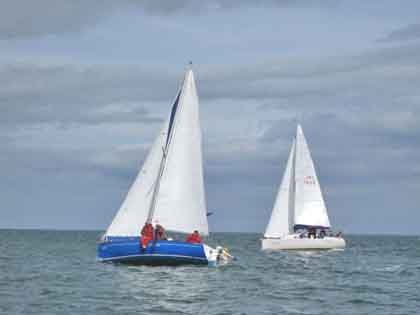Displaying items by tag: ASC
Arklow Sailing Club
This year (2009) Arklow Sailing Club celebrates their 40th anniversary with increased vigour and energy. Originally founded by a handful of local enthusiasts in 1969, the club operates from a base on the North Quay in Arklow town, on the east coast.
 Left: some of the entrants in the Arklow SC Kilmichael Challenge 2009
Left: some of the entrants in the Arklow SC Kilmichael Challenge 2009
Membership is currently over 130 registered members, but there are many more that go sailing on a regular basis; taking advantage of crewing positions on members’ boats.
Although there are a number of power boat and dinghy owners in the club, the majority of boats are yachts. In fact there are over 50 yachts within the club, involved in either cruising or racing, although some members are interested in both activities.
Club activities range from cruising in company, cruiser races on Wednesday evenings and Saturday afternoons, Squib racing, training and a number of Annual Regattas.
Recently the Club have undertaken work to a defined development plan for the next ten years. Developed in conjunction with the ISA, Arklow Sailing Club aims to encourage increased activity with current members, but more crucially, they identified a need to attract and retain potential new members.
As early as 2005, the Club were looking towards the future and under the leadership of Brian Dempsey (Commodore 2005–2007) the development of an attractive training programme was identified as the way forward. The decision was taken to focus on adult training using small keelboats instead of dinghies. Not only would this enable the instructor to be in the boat with two beginners but additionally it would be more suitable to operate in the prevailing conditions.
Arklow Sailing Club is now the proud owner of a fleet of Squib keelboats. This fleet was funded through local sponsorship. Local businesses Arklow Shipping, Bridgewater Shopping Centre, Qualceram and George Kearon Ltd each provided a Squib and safety equipment to the Club.
With the successful introduction of the Squibs, individuals are now beginning to invest in individually owned Squibs thereby helping to build the fleet further.
Not all of those who try sailing catch the bug. However for those who do, this new club fleet is additionally available to the newcomers outside their training programme. This increases their opportunity to join in club cruises and racing using boats they are familiar with.
That this training programme is successful is obvious. 2008 has seen a 22% increase in new members, the majority of which were introduced to sailing and the Club structure through this new fleet of boats.
In 2008, under the Commodoreship of Paul Barrett, Arklow Sailing Club was certified as an ISA Training Centre and they continue to expand the range of ISA Training on offer.
One area that is popular is powerboat training. This again provides a
means for the Club to attract new members, particularly as they
recognise that not all boat users wish to rely solely on sail power.
Arklow Sailing Club also successfully applied for a grant under the
Department of Arts, Sport & Tourism Sports Capital Programme. This
allowed the Club purchase a brand new RIB from Lencraft, which is now
used as their Safety Boat.
2008 also saw the Club host the South East Coast Regatta, which attached visiting boats from clubs to the north and south of Arklow. This two day event rotates annually between the east coast clubs and Arklow worked hard to create a holiday atmosphere for the duration.
For 2009 the Club hosted a 40th Anniversary Regatta in June to celebrate their ongoing growth and success.
Arklow Sailing Club, c/o Paul Barrett, North Quay, Arklow, Co Wicklow, tel: 087 250 9330
Have we got your club details? Click here to get involved























































